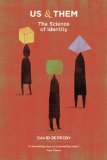Summary | Excerpt | Reviews | Beyond the Book | Readalikes | Genres & Themes | Author Bio

Critics' Opinion:
Readers' Opinion:
First Published:
Oct 2005, 384 pages
Paperback:
Oct 2008, 396 pages
 Book Reviewed by:
Book Reviewed by:
BookBrowse Review Team
Buy This Book
Then, too, even a trivial human kind, defined by nothing more
consequential than what people buy, can call up the intense emotions
supposedly reserved for the serious tribes. That's what happened to one
owner of a Porsche 911 sports car after he learned that the company had
started to make sport utility vehicles. "Every SUV I've seen is
driven by some soccer mom on her cellphone," he told a reporter.
"I hate these people, and that Porsche would throw me into that
category made me speechless. Just speechless."
Speechless! Kind-mindedness can be downright embarrassing. It lacks
gravitas. It goes its own way. That's a good reason for scientists to
shun the whole business. Who wants to be yelled at for supposedly
equating race and religion with soccer hooligans and Porsche owners?
And yelling there will be. Aside from being messy conceptually, human
kinds are sticky, emotionally. There's no place to stand outside of
them, to look on them without feeling. All people are members of human
kinds, and so whenever human kinds are the subject, the conversation
feels personal. Reading the news in the morning, we're pained to learn
that studies show "our people" are fat, or do poorly on math
tests, or don't spend enough time with their children. We're proud and
pleased when our athletes win at the Olympics, or when we read that our
troops acted nobly. We're scared when we learn about a human kind that
threatens ours. Presented with any list of human kinds - in a newspaper
article, on a Web site, on a restaurant place mat with the Chinese
zodiac printed on it - always, inescapably, a part of us wonders: Which
one fits me? Am I metro or retro? Gobbler or nibbler? Snake or horse?
Human-kind thoughts are impossible to separate from your feelings about
yourself.
Some scientists' distaste for human kinds as a research subject may
come from a desire to avoid thoughtless, factless passion. They want to
stay within the framework of science, confining themselves to matters
their methods can address. Outside that realm, many feel, science can't
venture, and scientists shouldn't. As the great physicist Richard
Feynman said, "A scientist looking at a non-scientific problem is
just as dumb as the next guy."
And what could be less like science than talk of race and nation and
religion, family and sexual identity and sports - veined as it always is
with vague words and strong emotions? Human kinds are gnarly, demanding,
and perplexing, like intimate life. If a human kind matters, people will
talk of it as if it were a family: the "brothers and sisters"
of houses of worship, union halls, and political rallies; the
"children of God" of the preachers; the "brothers"
who went through war, or college, or prison together; the friendly
office with the family atmosphere.
This doesn't mean, of course, that we think of such groupings as
literal families, or that we wish they were. If you call your sexual
partner "baby," it doesn't indicate you'd rather have sex with
an infant. But it is an expression of something everyone learns as
groups sort themselves on the playgrounds of early childhood: being part
of a human kind, or excluded from one, can alter your life. Such
consequential changes, wrought by being in a human kind, can be
conscious and deliberate, as it is for Christians who ask themselves,
"What would Jesus do?" Sometimes, though, the effects of
human-kind thinking take place outside awareness. In one experiment, for
example, Asian American women students at Harvard who were reminded that
they were Asian did better on a math test than Asian American women who
were reminded that they were women.
Copyright © 2005 by David Berreby. No part of this book maybe reproduced without written permission from the publisher.





The Funeral Cryer by Wenyan Lu
Debut novelist Wenyan Lu brings us this witty yet profound story about one woman's midlife reawakening in contemporary rural China.
Your guide toexceptional books
BookBrowse seeks out and recommends the best in contemporary fiction and nonfiction—books that not only engage and entertain but also deepen our understanding of ourselves and the world around us.